Related Research Articles
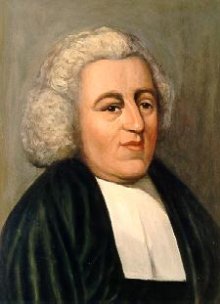
John Newton was an English Anglican cleric, a captain of slave ships who later became an investor in the slave trade but subsequently became an abolitionist. He served as a sailor in the Royal Navy for a period after forced recruitment.
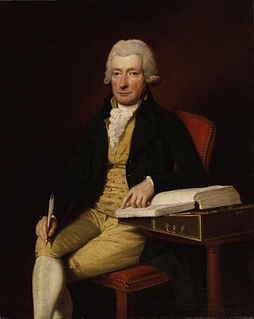
William Cowper was an English poet and hymnwriter. One of the most popular poets of his time, Cowper changed the direction of 18th-century nature poetry by writing of everyday life and scenes of the English countryside. In many ways, he was one of the forerunners of Romantic poetry. Samuel Taylor Coleridge called him "the best modern poet", whilst William Wordsworth particularly admired his poem Yardley-Oak.
This article contains information about the literary events and publications of 1782.

John Nichols was an English printer, author and antiquary. He is remembered as an influential editor of the Gentleman's Magazine for nearly 40 years; author of a monumental county history of Leicestershire; author of two compendia of biographical material relating to his literary contemporaries; and as one of the agents behind the first complete publication of Domesday Book in 1783.

William Cullen FRS FRSE FRCPE FPSG was a Scottish physician, chemist and agriculturalist, and professor at the Edinburgh Medical School. Cullen was a central figure in the Scottish Enlightenment: He was David Hume's physician, and was friends with Joseph Black, Henry Home, Adam Ferguson, John Millar, and Adam Smith, among others.

The Jacobite succession is the line through which Jacobites believed that the crowns of England, Scotland, and Ireland should have descended, applying primogeniture, since the deposition of James II and VII in 1688 and his death in 1701. It is in opposition to the line of succession to the British throne in law since that time.
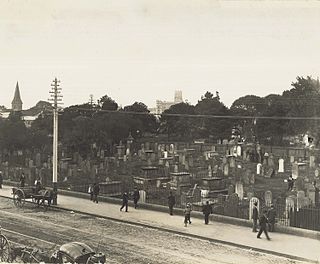
The Devonshire Street Cemetery was located between Eddy Avenue and Elizabeth Street, and between Chalmers and Devonshire Streets, at Brickfield Hill, in Sydney, Australia. It was consecrated in 1820. The Jewish section was used from 1832. By 1860, the cemetery was full, and it was closed in 1867.
The following lists events that happened during 1861 in Australia.
Nationality words link to articles with information on the nation's poetry or literature.

The Analytical Review was an English periodical that was published from 1788 to 1798, having been established in London by the publisher Joseph Johnson and the writer Thomas Christie. Part of the Republic of Letters, it was a gadfly publication, which offered readers summaries and analyses of the many new publications issued at the end of the eighteenth century.

Judith Madan was an English poet. She was the granddaughter of the diarist, Sarah, Lady Cowper (1644–1720) and aunt of the poet William Cowper. She was a correspondent, admirer and protégé of Alexander Pope prior to her marriage, and she composed an admired early-gothic work, Abelard to Eloisa, as a response to Pope's Eloisa to Abelard.
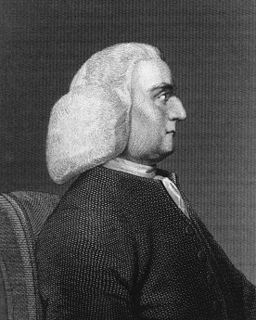
Nathaniel Cotton was an English physician and poet.

The Diverting History of John Gilpin Shewing how he went Farther than he intended, and came safe Home again is a comic ballad by William Cowper written in 1782. The ballad concerns a draper called John Gilpin who rides a runaway horse. Cowper heard the story from Lady Anna Austen at a time of severe depression, and it cheered him up so much that he put it into verse. The poem was published anonymously in the Public Advertiser in 1782, and then published with The Task in 1785. It was very popular, to the extent that "pirate copies were being sold all across the country, together with Gilpin books and toys."
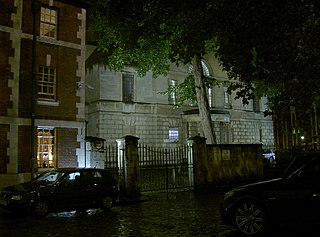
Lewin's Mead Unitarian meeting house is a former Unitarian church in Bristol, England.

Abolitionism in the United Kingdom was the movement in the late 18th and early 19th centuries to end the practice of slavery, whether formal or informal, in the United Kingdom, the British Empire and the world, including ending the Atlantic slave trade. It was part of a wider abolitionism movement in Western Europe and the Americas.
William Thomson (1746–1817) was a Scottish minister, historian and miscellaneous writer. He often wrote under the pseudonym of Captain Thomas Newte and this fictitious character had his own history and received independent recognition.

A Grade I-listed statue of Queen Anne stands on a pedestal alongside the north wall of No. 15 Queen Anne's Gate in Westminster, London. It portrays the queen wearing a brocaded skirt and bodice and an open cloak with the insignia of the Order of the Garter; on her head is a small crown and in her hands she holds an orb and sceptre. The statue, carved from Portland stone, stands on a plinth of the same material with the inscription ANNA REGINA. The pedestal consists of a fat "engaged" cylinder with a flat volute on either side, each with scrolls adorned with carved flowers and leaves. Neither the sculptor's identity nor the exact date of the work are known, but it is probably of the early eighteenth century.
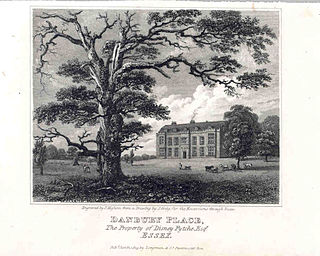
Lewis Disney Fytche, originally Lewis Disney, often known after his marriage as Disney Fytche, was an English radical and landowner.
Charles Longuet Higgins (1806–1885) was an English landowner, physician and benefactor.
The Dying Negro: A Poetical Epistle was a 1773 abolitionist poem published in England, by John Bicknell and Thomas Day. It has been called "the first significant piece of verse propaganda directed explicitly against the English slave systems". It was quoted in The Interesting Narrative of the Life of Olaudah Equiano of 1789.
References
- ↑ "Historical Analysis". Marymount University. Retrieved 14 February 2017.
- ↑ Fulford, Tim; Kitson, Peter J. ""Romanticism and colonialism: races, places, peoples, 1785-1800," page 4 of 5". www.rc.umd.edu. Retrieved 14 February 2017.
- ↑ Ingrassia, Catherine E.; Ravel, Jeffrey S. (4 May 2005). Studies in Eighteenth-Century Culture. JHU Press. p. 107. ISBN 9780801881923 . Retrieved 14 February 2017.
- ↑ Fairer, David; Gerrard, Christine (3 December 2014). Eighteenth-Century Poetry: An Annotated Anthology. John Wiley & Sons. p. 627. ISBN 9781118824757 . Retrieved 14 February 2017.
- ↑ Cowper, William (1913). Milford, H. S. (ed.). The Complete Poetical Works. London: Oxford University Press. pp. 371-372.